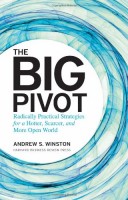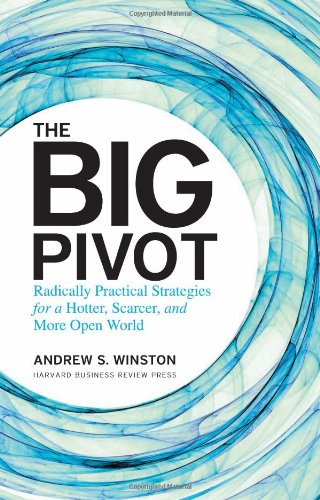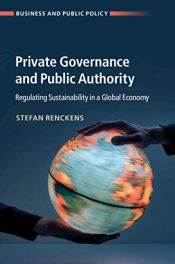 Author: Andrew S. Winston
Author: Andrew S. Winston
Publisher: Harvard Business Review Press – 344 pages
Book Review by: Sonu Chandiram
A pivot is a moment in your life after an event that could have cost you loss in some way. A big pivot is that moment in your life after a crucial event that could have cost you your very life. That event could have been a massive heart attack you had. There are usually warning signs around you that things are not going well for you – in whatever area of your life – and you need to do something, to make a drastic change in your life.
In terms of your health for example, if you are obese, a smoker, have a family history of heart disease, have high cholesterol, are stressed, your chances of a heart attack are higher than someone who does not have these risk factors. The right thing to do if you have any of these factors is to go see your doctor right away. He will give you a prescription for a blood test or a series of tests to be done at a local lab. Be glad that your blood is being drawn and will be examined, because you have taken the first important step: getting the facts about your health.
But all this means nothing if you do not do what the doctor orders you to do, which could be a combination of the right exercise, diet, medication, and lifestyle changes. If we do nothing to act on the warning signs, it is certain that we will face disaster. Andrew Winston writes in his Introduction us of what television host Dr. Mehmet Oz told his audience: statistics show that 40 percent of first heart attacks are fatal.
In this riveting book, Andrew Winston points out to us the many warning signs around us that our entire planet is now endangered. He mentions just a few events – in the last three years alone and in the United States and Bangladesh only – caused by climate change that have hurt people in various ways, including: mass deaths, loss of hundreds of millions of dollars, loss of homes, wiping out of thousands of jobs, plunging company stock prices, and other devastating results:
- Dhaka, Bangladesh – April 23, 2013: Collapse of a factory building in which more than 1,100 people died. The collapse happened only six months after a deadly fire raged in a nearby manufacturing facility, caused by rising temperatures and improper maintenance of electrical equipment.
- New York, New York – October 29, 2012: Explosion of an electric substation in Manhattan’s lower east side, after flooding caused by Hurricane Sandy. Con Edison announced they would have to spend $550 million for rebuilding and repairs.
- Some 200 people in the United States and the Caribbean lost their lives during Hurricane Sandy, and tens of thousands lost their homes.
- Con Edison lost about $2 billion of market capitalization during Hurricane Sandy.
- Plainview, Texas – February 2013: A beef processing plant that had been running for decades, shut down. Some 2,300 workers lost their jobs. Drought had dried up the pastures, beef had nothing to eat, and ranchers sold off their herds.
Winston points out in this book that extreme weather (higher temperatures and more humidity, for example) driven by climate change, plus the addition of a billion more people to our world’s middle class (who consume more resources) has resulted in making those resources scarcer. But while we’re hotter and our resources are scarcer, the flip side is that adversities have brought us opportunities that large corporations and entrepreneurs can avail of to make their lives better.
He presents our challenges in Part I of this book, then discusses the opportunities available in Part II, in particular actions we should take (e.g. “fight Short-Termism, set big goals in science, pursue heretical innovation, etc. as titles of his chapters we list below):
- Today’s Mega Challenges
- Hotter (and Cleaner)
- Scarcer (and Richer)
- More Open (and Smarter)
- A New Mind-Set
- Radically Practical Strategies
- VISION PIVOT
- Fight Short-Termism
- Set Big, Science-Based Goals
- Pursue Heretical Innovation
- VALUATION PIVOT
- Change the Incentives, Engage the Whole Organization
- Redefine Return on Investment to Make Better Strategic Decisions
- Put a Number on the Value of Natural Capital
- PARTNER PIVOT
- Become a Lobbyist
- Collaborate Radically
- Inspire Customers to Care and Use Less
- BIG PIVOT
- Build A Resilient, Anti-fragile Company
- Conclusion
So get hold of a copy of this unique right book now to make your life better. You’ve heard the saying: “where there is adversity, there is opportunity.” So what are you waiting for?
Andrew S. Winston is the founder of Winston Eco-Strategies, advising many of the world’s leading companies on environmental strategy. He sits on sustainability boards for Kimberly-Clark, Hewlett-Packard, and Unilever, and serves as Sustainability Advisor to PwC.
Andrew’s career history includes corporate strategy consulting with the Boston Consulting Group and management positions in strategy and marketing at Time Warner and MTV. A globally recognized expert in green business strategy, he is a sought-after speaker on the world’s mega challenges and how companies can manage and profit from them,
He is the bestselling author of Green to Gold. He writes regularly for Harvard Business Review online, the Guardian, and other outlets, and appears in major media such as The Wall Street Journal, The New York Times, and CNBC.







